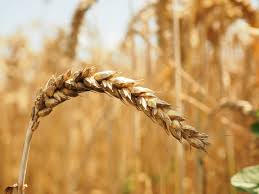grain of wheat
Dying To Self

5th Sunday of Lent
Fr. Paul Patrick, O.M. I.
Preached: March 21, 2021
Intro:
At the beginning of our Gospel reading an interesting scene unfolds. A number of Greeks who were at the Jewish festivities came over to the disciples in order to see Jesus. These Greeks were most likely not interested in meeting Jesus purely for religious motives, but likely rather due to the fame and recognition which followed Jesus at this time. These Greeks singled out Phillip among the disciples to inquire about Jesus, probably due to Phillip’s name and his origins. In fact, Phillip was named after the founder of the Greek city Phillipi and was originally from Bethsaida, near the Decapolis which no doubt provided a cultural connection and common ground.
Traditionally during this time period Greeks were generally interested in philosophy and were not followers of Judaism. They had their own gods and worship practices. They were however often interested in philosophy and as such were open to other culture’s ways of thinking and practice especially as they saw it pertaining to gaining wisdom.
This scene then leads to Jesus giving a discourse on his sacrificial love for others and the meaning of life. In particular, Jesus uses an agrarian analogy which although largely lost on our modern society, was a part of every day life for his listeners. This Gospel passage, could be perhaps misunderstood, especially if taken out of context. It is however, a beautiful reflection on the meaning and the beauty of life.
Unless a grain of wheat falls on the ground and dies…
Jesus’s analogy of a grain of wheat reminds us of an age-old dilemma: If you have a handful of wheat, is it better to eat the whole thing right away and enjoy it? Or is it better to plant the seeds and wait? In waiting, you will have more wheat than when you started – but – you will have to sacrifice and go without until it’s ready to be harvested. Over time, you can increase your amount of wheat from a handful to hundreds of acres worth by saving seed, but it takes time, discipline, and sacrifice to arrive at that point. It’s very tempting to eat the handful of wheat and not have to sacrifice anything. Yet, in sacrificing and waiting, you can eventually turn a handful of wheat into thousands of bushels.
…it remains a single grain
Jesus uses this analogy to drive home to his agrarian listeners that ‘dying to self’ or making sacrifices for a worthy cause can produce immense reward in our lives. We live this truth out to a certain extent already in our society. For example, we sacrifice a significant part of our adolescent lives in pursuit of education. We die to our self and make sacrifices in order to gain knowledge. We go to the gym and sacrifice our bodies and push sore muscles in order to obtain a stronger body.
For those who love their life will loose it but those who hate their life will save it
This truth holds true not only in the physical sense but in all aspects of our life. If we focus solely on ourselves and sacrifice nothing for others, we will lose out on some of the most beautiful aspects of life, such as relationships. Someone who never dies to themselves and never lives for others will not have a full understanding of what a real relationship is. When we die to ourselves and sacrifice our time and some of ourselves for others, we reap a gain of community, comradery, and true love between others and ourselves. Those who are afraid to sacrifice anything for others, or who are afraid to risk anything and want to ‘play it safe’ are ironically most at risk to missing out on what actually makes life beautiful.
When we look at it this way – this Gospel doesn’t seem so misunderstood. It is therefore not that Jesus is telling us to have a miserable life but instead giving us the most important key to living a rich and full life in all aspects.
Where Is Jesus – Fr. Mark

Fifth Sunday of Lent – Year B
Fr. Mark Gatto
Preached: Mar 18 2018
Jesus says, “where I am, there will my servant be also.” We are to be where Jesus is. So, where will we find Jesus today, in our world, in your life? A good examination of our conscience is to ask ourselves, where is Jesus today, where would Jesus be today?
Where will we find Jesus today?
- Parents – start at home, with your own children. Find Jesus there in them, including when they are difficult, when they are struggling, when they are having trouble at school, when you find them involved with drugs, be there for Jesus is there to bring healing, mercy.
- Grandparents – find Jesus in your grandchildren. Love and pray for them as Jesus with them.
- The Church, you and I, we need to find Jesus in the poor, the homeless, refugees, those struggling with mental illness, the lonely, the elderly, the sick, all those marginalized within our society for whatever reason. There is where we will find Jesus.
Now, what prevents us from going to be where Jesus is found? Jesus says, “those who love their life will lose it.” “unless a grain of wheat falls into the ground and dies, it remains just a single grain; but if it dies it bears much fruit.”
We desire a safe, comfortable life. So, fear is our greatest obstacle. Cowardice prevents us from going to be where Jesus is found. We prefer to go along with the crowd.
One of the results of giving in to fear is corruption. Corruption is present in so many areas of life, within so many institutions within our world. People are willing to cheat, to lie, in order to benefit themselves. Being successful is about being famous, wealthy, popular. It is achieved by defeating others by any means.
To be where Jesus is in our world today will require courage. To stand up against evil, to support those who face prejudice, to be on the side of the poor, the marginalized, those rejected by others. The courage to care about the most vulnerable in society even when it is not convenient. The poor, the unborn, the elderly, the terminally ill, those with disabilities.
All of us experience suffering in different ways. Suffering forces us to go deeper like the grain of wheat that must fall to the grain and die in order to bear fruit. But when we face suffering there are two different ways we can go deeper. We can go deeper in compassion and forgiveness or we can go deeper in anger and bitterness. Only by going deeper in compassion and forgiveness can bring us life.
In 2015 Pope Francis visited the Philippines. While there he was at a gathering of the youth. There he met a young 12 year old girl who tearfully recounted how she had spent her young life forced to forage for food from the garbage and to sleep outside on cardboard mats. She asked the Pope a simple but profound question. “Why did God let this happen to us?” Covering her face with her hands as she sobbed.
The Pope was deeply affected by her and put aside a text he had prepared for the occasion. Instead he responded directly to the young girl giving a reflection on the nature of suffering, love and service. He said to her “the nucleus of your question almost does not have a reply” Pain etched on his face as he mentioned that he had seen her tears. Then he said, “only when we too can cry about the things that you said are we able to come close to replying to that question.” “Why do children suffer.” “Certain realities in life we only see through eyes that are cleansed through our tears.” Pope Francis said.
Then he addressed the youth in the crowd, he could ask each of us here in this church, “I invite each one of you to ask yourselves: ‘Have I learned how to weep, how to cry when I see a hungry child, a child on the street who uses drugs, a homeless child, an abandoned child, an abused child, a child that society uses as a slave?” We need to learn to how to weep.
To be a Christian requires to be where Jesus is found. Jesus will be found where those most in need are found, in our homes, in our community, in our church. So, the church, you and I, must be there as well. Loving our life will cause us to avoid where Jesus is found today.
Fear, the desire for a safe and comfortable life, will keep us away. We need to be like the grain of wheat that falls to the ground and dies. We need to go deeper not in anger and bitterness, but deeper in compassion and forgiveness. We need to be able to cry when we see injustice, suffering, people hurting. Tears that lead us to be where Jesus will be found, bringing peace, healing, care.
Seeds In The Desert – Fr. David

Fifth Sunday of Lent – Year B
Fr. David Reitzel
Preached: Mar 18 2018
St. Paul, in his first letter to the Corinthians says that he preaches Christ Crucified and that this teaching is a stumbling block to Jews and foolishness for gentiles (1 Cor 1:23). What St. Paul is saying is that when he tells people about the crucifixion of Jesus they don’t get it. The Jews wonder how someone could be the Messiah if he died, and gentiles, non-Jews, wonder how someone could be anyone important if he was killed. The teaching that God was victories over the powers of this world, over sin and death, by dying just didn’t make sense to them.
The truth is Jesus’ death on the cross wasn’t hard just for the Jews and gentiles Paul met. It was hard for everyone to understand. When Jesus announced to his disciples that he would die, Peter responded by saying “Never, Lord. .. This shall never happen to you” (Matt 16:22).
When Jesus told the temple authorities to destroy this temple and in three days he would build it up, his disciples only realized afterword that he meant the temple of his body (Jn 2:19). And finally on the night Jesus was betrayed, when Judas and the guards met him in the garden of Gethsemane, Peter again did not understand and picked up a sword to fight (Lk 22:49).
The cross of Christ was hard for everyone to understand. It is for this reason that Jesus tried to prepare his followers for it. Three times he told his disciples that he would be crucified, so that when it came they would know it was part of the plan (Mk 8:31; 9:30; 10:33). He was transfigured on mount of Transfiguration before Peter, James, and John to strengthen their faith for the time when they would see Jesus in his passion (Matt 17). And today we see Jesus again trying to prepare people for his coming death.
Today we read how Jesus was in Jerusalem for the Passover and some Greeks wanted to see him. The Greeks turned to Philip, no doubt because he had a Greek name, to see if he can arrange the meeting. As the Greeks approached Jesus, we don’t know what their purpose was. What did they want to talk about? What did they want to learn? Greeks were philosophers, interested in understanding all the phenomena in the world. Maybe they wanted to discuss where lightening comes from.
Whatever it was they had in mind, they didn’t expect the direction the conversation would go. Before they had an opportunity to even ask a question Jesus told them, “Very truly I tell you, unless a grain of wheat falls into the earth and dies it remains just a single grain, but if it dies it bears much fruit”(Jn 12:24). We can almost imagine the Greeks slowly saying, “O . . .K . . . Why are you telling us this?”
Why is Jesus telling them this? Why are these the first words out of his mouth? Well, these Greeks who were in Jerusalem for the Passover, were about to witness the passion and death of the man they were now talking to. Jesus wanted them to know that his death is not without purpose, it is like a seed that will bear fruit.
I never realized just how powerful the analogy of the seed was until I watched a National Geographic special on deserts. When we think of a desert, what usually comes to mind is a barren wasteland with no plants, no water, and only sand. However, what I learned is that in the desert there are thousands upon thousands of seeds scattered in every square meter of the sand. These seeds can be hundreds of years old and they are still alive.
If you pick them up and put them in soil and add water, they grow, but while they are in the desert they just remain seeds. The people of Israel, who lived with deserts nearby would have understood this. So when Jesus said that a seed must die if it is to bear fruit, they would have thought of the desert with all its seeds that never grow. Because these seeds won’t die, because they remain seeds, the place they inhabit is a desert rather than a garden, a place of death rather than life. If only the seeds would give up their lives would there be life throughout the desert.
Like almost everyone else who listened to Jesus, the Greeks that stood before him likely did not understand that he was referring to himself when he talked about death and life. But Jesus’ plan was to tell them these things before so that when they saw him on the cross they would remember and understand.
Two thousand years after these events, we still remind ourselves of them because we also need help understanding the cross of Christ. We can look at Jesus nailed to the cross and ask ourselves the question, Why? Why did he have to die? And the more we think about the details of the event, the nails, the thorns, the whips, the lance, the more we ask ourselves the question, Why? It is in that moment that we need to hear the words of Christ: “Unless a grain of wheat falls into the earth and dies it remains just a single grain, but if it dies it bears much fruit”.
The souls that walked this world were a desert before the death of Christ. They waited for that seed which would sacrifice itself. Jesus is that seed and it is through his death that our souls now have life.


